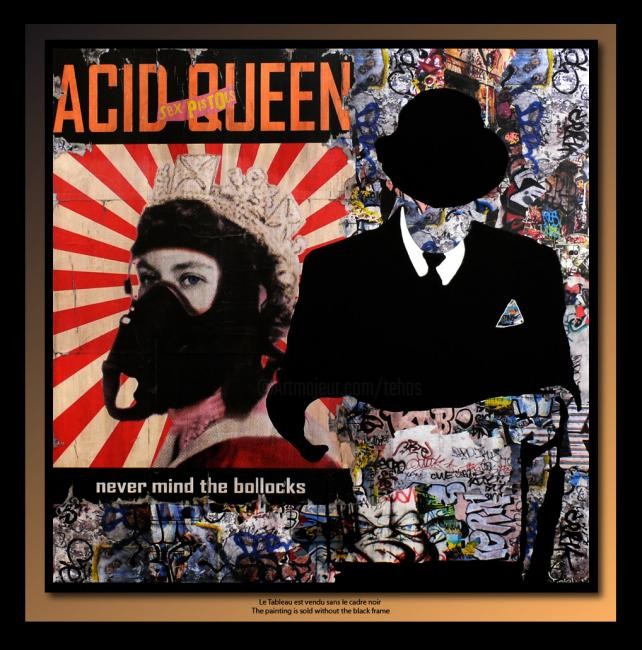Never mind the Bollocks (2013) Sold
39.4x39.4 in ~ Painting, Oil
Contact
Tableau de Tehos acrylique et marouflage sur toile 100*100 cm
Dans les année 70 l'Angleterre est traversée par une grave Crise économique, sociale, politique et culturelle.
L'interventionnisme est à l'ordre du jour avec de nombreuses nationalisations et 29,3 % de la population active employée dans le secteur public.
La situation est telle que le pays est surnommé « l'homme malade de l'Europe » et certains économistes se demandaient si l'on n'assistait pas à un phénomène de retrodevelopment (« développement inversé »), par lequel l'ancien « atelier du monde » serait en train de prendre la voie du sous-développement.
Les mesures d'austérité se succèdent,
En 1976, le gouvernement doit demander un prêt de 4 milliards $ au FMI. Le rejet de l'austérité salariale par les syndicats de fonctionnaires débouche sur l'« hiver du mécontentement ».
Dans ce contexte ,
Les Sex Pistols, groupe punk anglais se forme en 1975 à Londres. Ils sont connus pour être les initiateurs du mouvement punk au Royaume-Uni.
Le quatuor se compose de Johnny Rotten (Lydon de son vrai nom) au chant, Steve Jones à la guitare, Paul Cook à la batterie et Glen Matlock à la basse. Ce dernier est remplacé par Sid Vicious en 1977.
Le groupe connait une courte carrière de trois ans, un seul album studio est enregistré; Never Mind the Bollocks,
God Save the queen l'un des titres de l'album sorti aussi en 1977, prêtait notoirement à controverse, premièrement à cause de l'identification de la reine à un « régime fasciste », et deuxièmement à cause de l'affirmation apparente que l'Angleterre n'avait pas d'avenir (« no future »).
Bien que largement perçu comme une attaque à la reine Elizabeth II, Johnny Rotten déclare que le morceau ne la vise pas personnellement, mais établit une critique de la royauté en général. Le single est par la suite interdit à la diffusion par la BBC.
La célèbre pochette du single, montrant le visage de la reine Elisabeth II obstrué par le titre du morceau et le nom du groupe en lettres capitales, choque les copistes chargés d'imprimer la pochette. Après discussion, leur production reprend et le single sort comme prévu le 27 mai 1977.
Les paroles scandalisent et sont considérées comme provocantes par l'opinion publique britannique. Plusieurs stations de radio et de télévision refusent de diffuser le morceau. La BBC, mais aussi toutes les chaînes indépendantes en ont fait le titre britannique le plus censuré de tous les temps.
Sid Vicious, chanteur britannique, second bassiste éphémère des Sex Pistols devient une icône du mouvement punk. Victime de l'héroïne, apres s'être injecté une dernière dose lors d'une soirée, il est retrouvé mort le lendemain 2 Février 1979 dans son hôtel de Greenwich Village à New York
Le magazine Rolling Stone a classé God Save the Queen 173e dans sa liste des 500 plus grandes chansons de tous les temps ; c'est l'une des deux chansons du groupe figurant sur la liste avec Anarchy in the U.K
les Sex Pistols sont décrits par The British Broadcasting Corporation (BBC) comme « l'irrémédiable groupe de punk rock anglais »
England in the 70' is crossed by a severe economic crisis, social, political and cultural.
Interventionism is the agenda with many nationalizations and 29.3% of the workforce employed in the public sector.
The situation is such that the country is called the "sick man of Europe" and some economists wondered if you did not attend a phenomenon retrodevelopment ("reverse development"), by which the former " workshop of the world "would be taking the path of underdevelopment.
Austerity measures succeed,
In 1976, the government must seek a loan of $ 4 billion to the IMF. The rejection of wage austerity by public service unions leads to the "winter of discontent".
In this context,
The Sex Pistols, English punk band formed in 1975 in London. They are known for being the originators of the punk movement in the United Kingdom.
The quartet consists of Johnny Rotten (Lydon real name) on vocals, Steve Jones on guitar, Paul Cook on drums and Glen Matlock on bass. It is replaced by Sid Vicious in 1977.
The group knows a short three-year career, one studio album is recorded, Never Mind the Bollocks,
God Save the Queen one of the tracks on the album also released in 1977, lent notoriously controversial, primarily because of the identification of the queen a "fascist", and secondly because of the apparent assertion that England had no future ("no future").
Although widely perceived as an attack on the Queen Elizabeth II, Johnny Rotten says that the song is do not personally, but provides a critique of the monarchy in general. The single was subsequently banned for broadcasting by the BBC.
The famous cover of the single, showing the face of Queen Elizabeth II obstructed by the song title and group name in capital letters, shocked the copyists responsible for printing the cover. After discussion, production resumed and the single was released as planned on 27 May 1977.
The words shocked and are considered provocative by the British public. Several radio stations and television refused to broadcast the song. The BBC, but all channels have independent British title the most censored of all time.
Sid Vicious, British singer, fleeting bassist of the Sex Pistols, became an icon of the punk movement. Victim of heroin injecting after a final dose at a party, he was found dead the next 2 February 1979 in his house in Greenwich Village in New York
Rolling Stone magazine ranked 173rd God Save the Queen in its list of the 500 greatest songs of all time, this is one of the band's songs on the list with Anarchy in the UK
The Sex Pistols are described by The British Broadcasting Corporation (BBC) as "incurable English punk rock band"
Ref : Wikipedia.
Added
